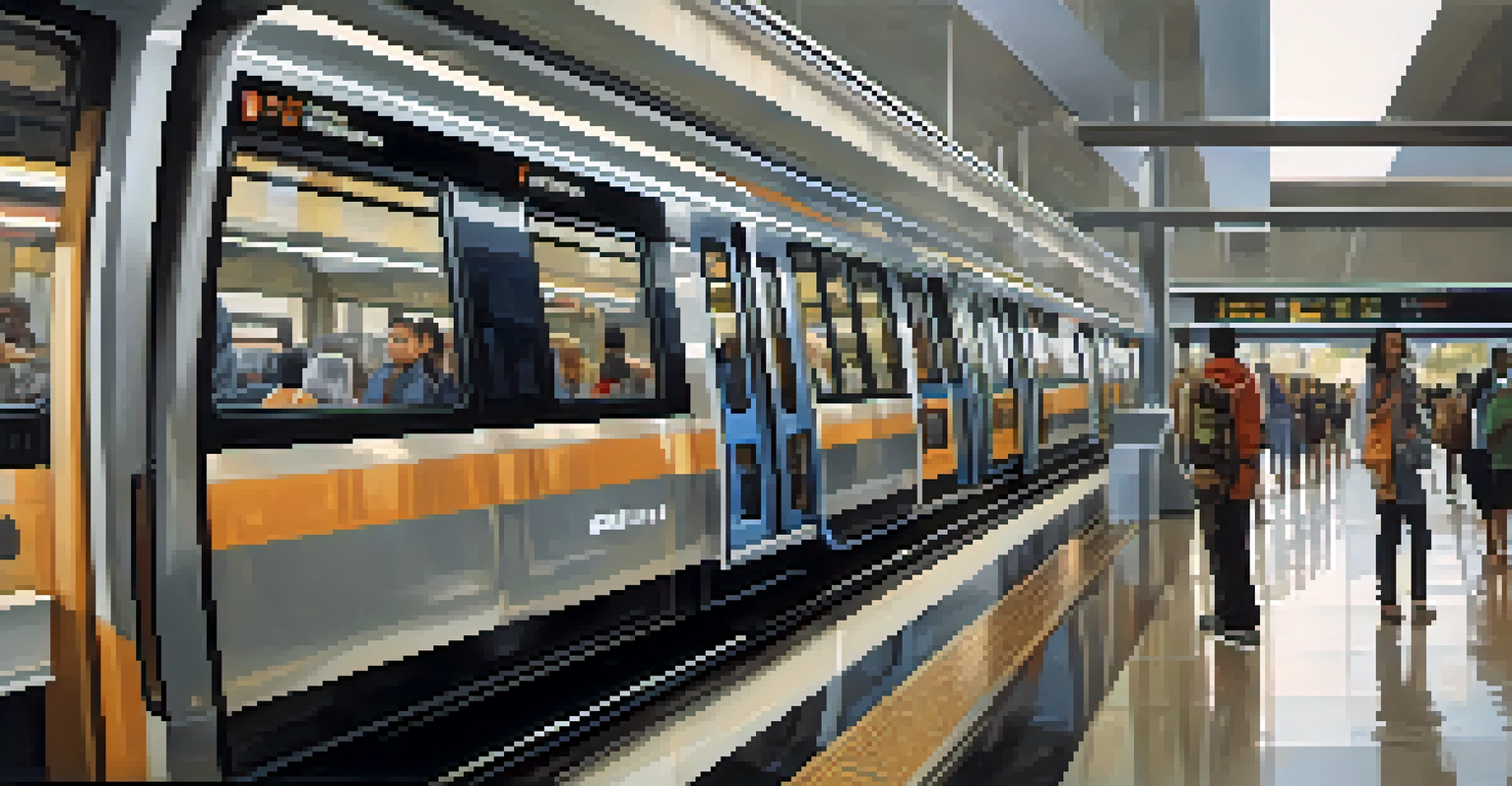The Role of Transportation in Atlanta's Economic Growth

Understanding Atlanta's Transportation Landscape
Atlanta's transportation system is a complex web that includes highways, public transit, and airports, all playing a vital role in the city's economy. The city's geographical location makes it a key transportation hub in the Southeast, facilitating both regional and national commerce. With major highways like I-75 and I-85 intersecting, goods can swiftly move in and out of the city, enhancing trade opportunities.
Transportation is the backbone of any economy. Without it, businesses cannot thrive and communities cannot grow.
Moreover, Hartsfield-Jackson Atlanta International Airport, one of the busiest airports in the world, not only connects Atlanta to global markets but also supports a substantial number of jobs. This airport is a gateway for businesses looking to expand, making it a crucial asset for economic growth. The ease of access to air travel further solidifies Atlanta's reputation as a business-friendly city.
Public transportation, including MARTA, plays a significant role in connecting residents to jobs, education, and services. By providing reliable transit options, Atlanta ensures that its workforce can access opportunities without the barriers of traffic congestion or long commutes.
The Impact of Transportation on Local Businesses
Transportation infrastructure directly influences the success of local businesses in Atlanta. A well-connected city means easier access for suppliers and customers, which can significantly boost sales and profitability. For instance, businesses situated near major highways or transit stations often see increased foot traffic, leading to more sales opportunities.

Additionally, improved transportation can lower operational costs for businesses, particularly for those relying on logistics and freight. With efficient routes and less congestion, companies can save time and money, which can be reinvested into other areas of their operations. This efficiency not only benefits individual businesses but also contributes to the overall economic health of the city.
Transportation Drives Economic Growth
Atlanta's transportation infrastructure is crucial for boosting trade, job creation, and local business success.
Moreover, transportation developments such as bike lanes and pedestrian-friendly areas can attract new businesses and encourage entrepreneurship. As neighborhoods become more accessible and appealing, they often see a rise in small businesses that cater to the local population, fostering a diverse economic landscape.
Transportation's Role in Job Creation
Transportation systems are not just about moving goods; they are also essential for job creation. In Atlanta, investments in public transit projects have led to thousands of jobs, both during construction and in ongoing operations. This job creation is vital for maintaining a stable economy and providing residents with employment opportunities.
A city's transportation system is a reflection of its values and priorities, shaping the lives of its residents and the success of its businesses.
Moreover, as the transportation infrastructure expands, it opens up new areas for development and investment. For example, the extension of transit lines often leads to the revitalization of previously underserved neighborhoods, creating jobs in construction, retail, and services. This ripple effect can significantly enhance the overall economic landscape of Atlanta.
The growth of the transportation sector also supports related industries, such as logistics, tourism, and hospitality. As more people travel to and through Atlanta, the demand for services in these sectors increases, further contributing to job growth and economic vitality.
Challenges Facing Atlanta's Transportation System
Despite its strengths, Atlanta's transportation system faces several challenges. Traffic congestion is a well-known issue, with the city often ranking among the most congested in the United States. This congestion not only affects daily commutes but also has broader implications for economic productivity and quality of life.
Additionally, funding for transportation projects can be a hurdle. While there are ongoing efforts to improve infrastructure, budget constraints and competing priorities can slow progress. This can hinder the city's ability to keep pace with growing demands and maintain efficient transportation networks.
Challenges in Transportation Access
Traffic congestion and inequitable public transit access pose significant challenges for Atlanta's residents and economy.
Moreover, equity in transportation access remains a critical concern. Many low-income neighborhoods are underserved by public transit, limiting opportunities for residents to access jobs and services. Addressing these disparities is essential for ensuring that all Atlantans can benefit from the economic growth driven by transportation.
The Future of Transportation in Atlanta
Looking ahead, Atlanta is exploring innovative transportation solutions to meet the demands of a growing population. Initiatives like smart traffic management systems and expanded public transit options are being considered to ease congestion and improve efficiency. These advancements aim to create a more sustainable and accessible transportation network for everyone.
Sustainability is also a key focus, with efforts to promote electric vehicles and public transportation that reduces carbon footprints. By embracing environmentally friendly practices, Atlanta can enhance its appeal as a forward-thinking city while addressing climate change concerns. This shift not only benefits the environment but also attracts businesses and residents who prioritize sustainability.
Community engagement is crucial in shaping the future of transportation in Atlanta. By involving residents in planning discussions and decisions, the city can ensure that transportation solutions meet the needs of all stakeholders. This collaborative approach can foster a sense of ownership and investment in the transportation system, ultimately contributing to a stronger economy.
The Role of Technology in Transportation Evolution
Technology is revolutionizing transportation in Atlanta, impacting everything from logistics to public transit. The rise of ride-sharing apps and delivery services has changed how residents navigate the city, providing convenient options that complement traditional transportation methods. This shift has not only made commuting easier but has also created new business opportunities.
Furthermore, advancements in logistics technology are streamlining supply chains and improving delivery times for businesses. Companies can now utilize data analytics and GPS tracking to optimize routes and manage their fleets more efficiently. These innovations contribute to lower operational costs and enhanced customer satisfaction, driving economic growth.
Future Focus on Sustainable Solutions
Innovative transportation initiatives and community engagement are key to creating a sustainable and accessible future for Atlanta.
Smart city initiatives are also on the rise, incorporating technologies that improve traffic management and reduce congestion. By leveraging real-time data, Atlanta can make informed decisions about infrastructure investments and maintenance. This proactive approach can lead to a more efficient transportation system that supports the city’s economic goals.
Transportation's Influence on Real Estate Development
The relationship between transportation and real estate development in Atlanta is profound. Areas with robust transportation access tend to see higher property values and increased investment. Developers often prioritize locations near transit hubs, knowing that convenient access can attract tenants and buyers alike.
As public transit expands, it opens up new opportunities for mixed-use developments that cater to a diverse range of residents and businesses. These developments not only enhance the livability of neighborhoods but also contribute to the local economy by creating jobs and generating tax revenue. The synergy between real estate and transportation can lead to vibrant communities that thrive economically.

Additionally, transportation improvements can lead to gentrification, where rising property values displace long-time residents. It’s crucial for city planners to balance development with affordable housing initiatives to ensure that economic growth benefits everyone, creating an inclusive environment in Atlanta.
Conclusion: Transportation as a Catalyst for Growth
In conclusion, transportation is a cornerstone of Atlanta's economic growth, influencing everything from job creation to real estate development. The city's strategic investments in transportation infrastructure pave the way for future opportunities, connecting communities and businesses across the region. As Atlanta continues to grow, its transportation systems will remain vital in shaping its economic landscape.
However, facing challenges such as congestion and equity in access will require ongoing attention and adaptation. By embracing innovative solutions and engaging with the community, Atlanta can build a transportation system that serves all residents effectively. This collaborative effort is essential for ensuring that the benefits of growth are shared widely.
Ultimately, Atlanta's commitment to enhancing its transportation network reflects a broader vision for a thriving, interconnected city. By recognizing the integral role of transportation in economic development, Atlanta can continue to foster an environment where businesses flourish and residents thrive.